Many、much、some、any区别
常见不定代词的用法
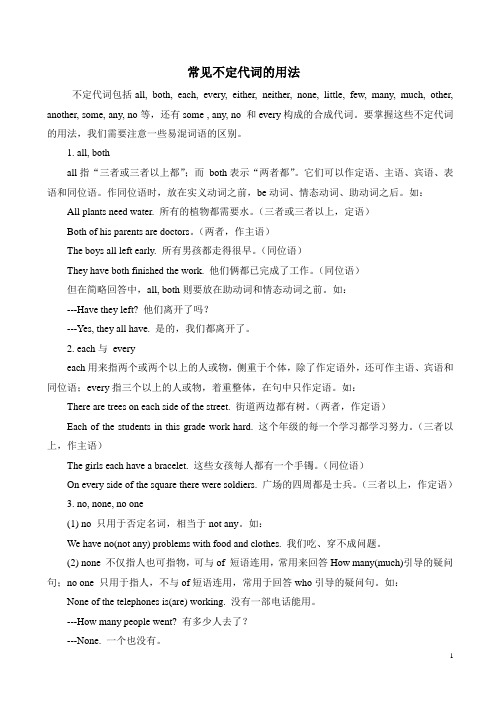
常见不定代词的用法不定代词包括all, both, each, every, either, neither, none, little, few, many, much, other, another, some, any, no等,还有some , any, no 和every构成的合成代词。
要掌握这些不定代词的用法,我们需要注意一些易混词语的区别。
1. all, bothall指“三者或三者以上都”;而both表示“两者都”。
它们可以作定语、主语、宾语、表语和同位语。
作同位语时,放在实义动词之前,be动词、情态动词、助动词之后。
如:All plants need water. 所有的植物都需要水。
(三者或三者以上,定语)Both of his parents are doctors。
(两者,作主语)The boys all left early. 所有男孩都走得很早。
(同位语)They have both finished the work. 他们俩都已完成了工作。
(同位语)但在简略回答中,all, both则要放在助动词和情态动词之前。
如:---Have they left? 他们离开了吗?---Yes, they all have. 是的,我们都离开了。
2. each与everyeach用来指两个或两个以上的人或物,侧重于个体,除了作定语外,还可作主语、宾语和同位语;every指三个以上的人或物,着重整体,在句中只作定语。
如:There are trees on each side of the street. 街道两边都有树。
(两者,作定语)Each of the students in this grade work hard. 这个年级的每一个学习都学习努力。
(三者以上,作主语)The girls each have a bracelet. 这些女孩每人都有一个手镯。
(同位语)On every side of the square there were soldiers. 广场的四周都是士兵。
some和any的用法
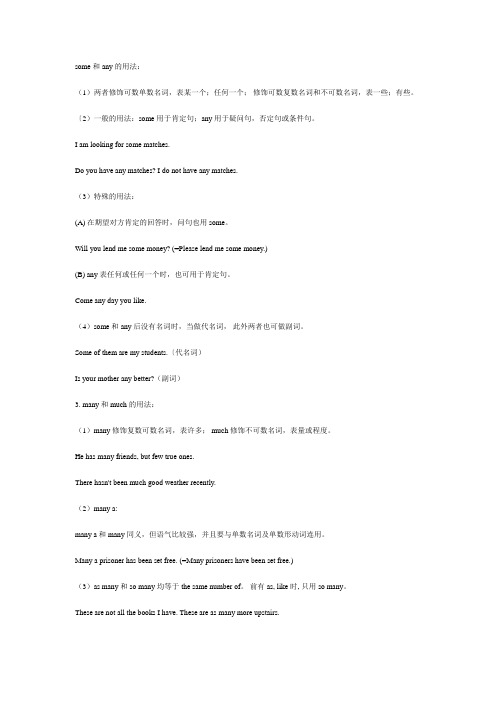
some和any的用法:(1)两者修饰可数单数名词,表某一个;任何一个;修饰可数复数名词和不可数名词,表一些;有些。
〔2)一般的用法:some用于肯定句;any用于疑问句,否定句或条件句。
I am looking for some matches.Do you have any matches? I do not have any matches.(3)特殊的用法:(A) 在期望对方肯定的回答时,问句也用some。
Will you lend me some money? (=Please lend me some money.)(B) any表任何或任何一个时,也可用于肯定句。
Come any day you like.(4)some和any后没有名词时,当做代名词,此外两者也可做副词。
Some of them are my students.〔代名词)Is your mother any better?(副词)3. many和much的用法:(1)many修饰复数可数名词,表许多; much修饰不可数名词,表量或程度。
He has many friends, but few true ones.There hasn't been much good weather recently.(2)many a:many a和many同义,但语气比较强,并且要与单数名词及单数形动词连用。
Many a prisoner has been set free. (=Many prisoners have been set free.)(3)as many和so many均等于the same number of。
前有as, like时, 只用so many。
These are not all the books I have. These are as many more upstairs.They worked like so many ants.(4)as much等于the same amount of, 表同量和同一事情。
any some many much 区别与用法(一)
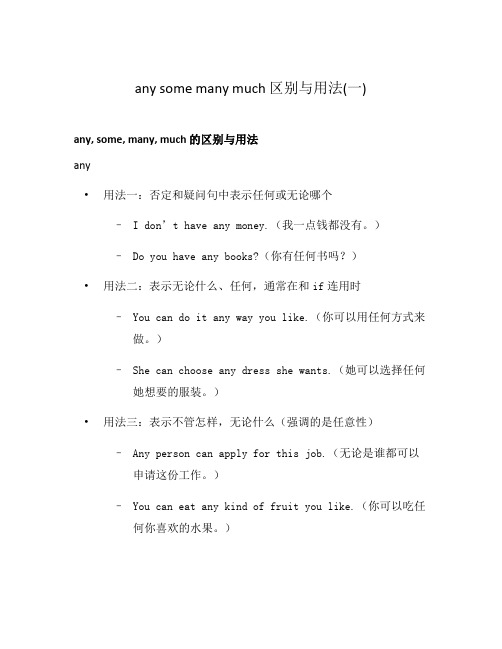
any some many much 区别与用法(一)any, some, many, much 的区别与用法any•用法一:否定和疑问句中表示任何或无论哪个–I don’t have any money.(我一点钱都没有。
)–Do you have any books?(你有任何书吗?)•用法二:表示无论什么、任何,通常在和if连用时–You can do it any way you like.(你可以用任何方式来做。
)–She can choose any dress she wants.(她可以选择任何她想要的服装。
)•用法三:表示不管怎样,无论什么(强调的是任意性)–Any person can apply for this job.(无论是谁都可以申请这份工作。
)–You can eat any kind of fruit you like.(你可以吃任何你喜欢的水果。
)some•用法一:表示一些、若干,通常用于肯定句中–I bought some flowers for my mother.(我给我妈妈买了一些花。
)–Can you give me some advice?(你可以给我一些建议吗?)•用法二:表示某种(不确定或未指明的数量)–I need some time to think about it.(我需要一些时间来考虑。
)–She wants to buy some clothes at the mall.(她想在商场买些衣服。
)many•用法一:表示许多、很多,用于可数名词复数形式中–There are many students in the classroom.(教室里有很多学生。
)–He has visited many countries.(他去过很多国家。
)•用法二:表示多次(表示频繁或重复)–She has been to Europe many times.(她去欧洲很多次。
限定词(some,any,many,much, more,most, lots, few, little

the more…, the more…越…,就越...
The more I thought about it, the less I liked the idea
more and more + adj./ adv.越来越…
Changan Avenue is getting more and more beautiful.
a little (+ n.)一点儿,少量(= not much),修饰不可数名词
Ilikealittle butter on my bread.(=Idon’t like much butter on my bread.)
a few of + n.一些、几个
Let me briefly highlight a few of the achievements of the past year.
Many people took part in 10,000-metre race, but only a number of them kept on running to the end.
many/much
many/muchadj. (more/most)
可以在前面接very, so, too等词修饰。
The situation has improved very little.
a few/a little
a few (+ n.)一些、几个(= not many),修饰复数名词,比few表示的数量要多。
Only a few stayed for dinner.
Jane knows a few people in Shanghai.(= Jane doesn’t know many people in Shanghai)
some much many little few用法全解
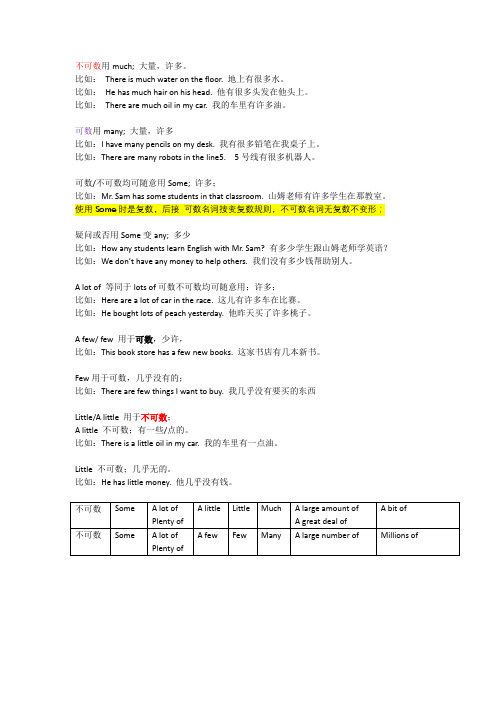
不可数用much; 大量,许多。
比如:There is much water on the floor. 地上有很多水。
比如:He has much hair on his head. 他有很多头发在他头上。
比如:There are much oil in my car. 我的车里有许多油。
可数用many; 大量,许多比如:I have many pencils on my desk. 我有很多铅笔在我桌子上。
比如:There are many robots in the line5. 5号线有很多机器人。
可数/不可数均可随意用Some; 许多;比如:Mr. Sam has some students in that classroom. 山姆老师有许多学生在那教室。
使用Some时是复数,后接可数名词按变复数规则,不可数名词无复数不变形;疑问或否用Some变any; 多少比如:How any students learn English with Mr. Sam? 有多少学生跟山姆老师学英语?比如:We don’t have any money to help others. 我们没有多少钱帮助别人。
A lot of 等同于lots of可数不可数均可随意用;许多;比如:Here are a lot of car in the race. 这儿有许多车在比赛。
比如:He bought lots of peach yesterday. 他昨天买了许多桃子。
A few/ few 用于可数,少许,比如:This book store has a few new books. 这家书店有几本新书。
Few用于可数,几乎没有的;比如:There are few things I want to buy. 我几乎没有要买的东西Little/A little 用于不可数;A little 不可数;有一些/点的。
someanymanymuch区别

04
实例分析
some的实例分析
总结词
表示“一些”
VS
详细描述
在句子中,some可以表示“一些”,用于 修饰可数名词或不可数名词。例如,“I have some books.”表示“我有一些书”。
anyone的实例分析
总结词
表示“任何人”
详细描述
在句子中,anyone可以表示“任何人”, 用于否定或疑问句中。例如,“Do you know anyone who can help me?”表示 “你认识能帮助我的人吗?”。
any的用法
any用于肯定句和否定句,表示“任 何”,可修饰可数名词或不可数名词。
03
常见错误与注意事项
混淆用法
总结词
混淆some、any、no的用法
详细描述
some和any常用于肯定句和一般疑问句,no常用于否定句。但在表示请求或建议的疑问句中,常用 some而不用any。
语境选择错误
总结词
some、 anymanymuch区别
• 定义与含义 • 用法与区别 • 常见错误与注意事项 • 实例分析
目录
01
定义与含义
some
总结词
表示“一些”,用于可数或不可数 名词
详细描述
some用于肯定句中,表示“一 些”,可数名词和不可数名词都可 以使用。
anyone
总结词
表示“任何人”
详细描述
anyone的用法
anyone用于否定及疑问句,表示“任何人”,一般指人。
many与much的区别
many的用法
many修饰可数名词复数,表示“许 多”。
much的用法
much修饰不可数名词,表示“许多” 。
不定代词的用法
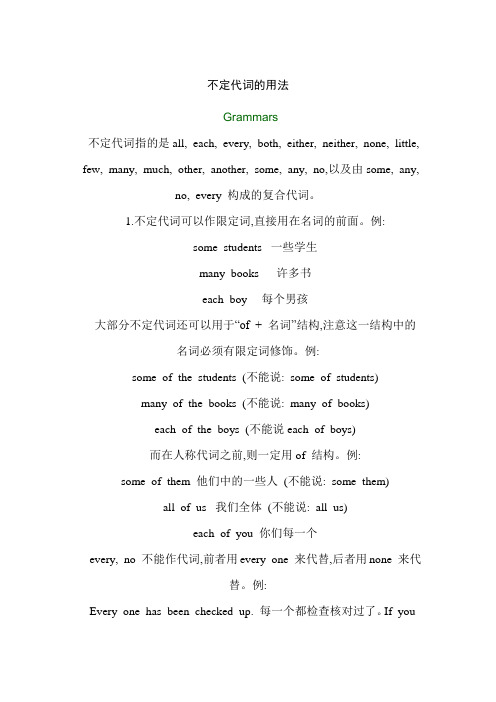
不定代词的用法Grammars不定代词指的是all, each, every, both, either, neither, none, little, few, many, much, other, another, some, any, no,以及由some, any,no, every 构成的复合代词。
1.不定代词可以作限定词,直接用在名词的前面。
例:some students 一些学生many books 许多书each boy 每个男孩大部分不定代词还可以用于“of + 名词”结构,注意这一结构中的名词必须有限定词修饰。
例:some of the students (不能说: some of students)many of the books (不能说: many of books)each of the boys (不能说each of boys)而在人称代词之前,则一定用of 结构。
例:some of them 他们中的一些人(不能说: some them)all of us 我们全体(不能说: all us)each of you 你们每一个every, no 不能作代词,前者用every one 来代替,后者用none 来代替。
例:Every one has been checked up. 每一个都检查核对过了。
If youneed a repairman, there's none better than my brother.如果你需要一位修理工,没有谁比我的弟弟更好的了。
everyone/everybody 之后不接of短语,而every one 之后接of 短语。
例:Every one of us was surprised to hear the news. 我们每一个人听了这个消息后都很惊奇。
all 或both 后接of短语时,of 常常省去。
例:all (of) my friends 我的所有朋友both (of) Tom's friends 汤姆的两个朋友2.little 和few 都可以作代词和限定词用,little 用来指不可数的事物或修饰不可数的事物;而few 则用来指可数的事物(人)或修饰可数的事物(人)。
Some any many much用法及练习

Some/any/many/much的用法及练习some意为“一些”、“几个”,通常用于肯定句中。
其主要用法如下:1、some作形容词用时,可以修饰复数可数名词,也可以修饰不可数名词。
例如:There are some students in the classroom. 教室里有几个学生。
There is some milk in the glass. 杯子里有一些牛奶。
2、some作代词用时,可在句中作主语或宾语。
例如:Some of the boys are playing games now. 有几个男孩现在正在做游戏。
I have no paper. Please give me some. 我没有纸了,请给我一些吧。
3、some也可以用在疑问句或条件句中,表示请求、建议、并期望得到对方的肯定回答。
还可以用于反问句。
如:Would you like some…?Why not…? What abut…? Could you …?例如:Can you give me some money? 你能给我一些钱吗?Would you like some more rice? 再来点米饭好吗?Why don’t you buy some flowers for her? 你为什么不给她买些花呢?If you want (some), I’ll give you some. 如果你想要(一些),我就给你一些。
any也有“一些”的意思,但它常用在否定句、否定答语或疑问句中。
其具体用法如下:1、any作形容词用时,可以修饰可数名词的单数或复数,也可以修饰不可数名词。
例如:Do you have any questions to ask? 你有什么问题要问吗?There isn’t any water in this bottle. 这个瓶子里没有水。
2、any作代词用时,也可用于肯定句中,表示“任何”的意思,起强调作用。
新概念一语法知识点总结
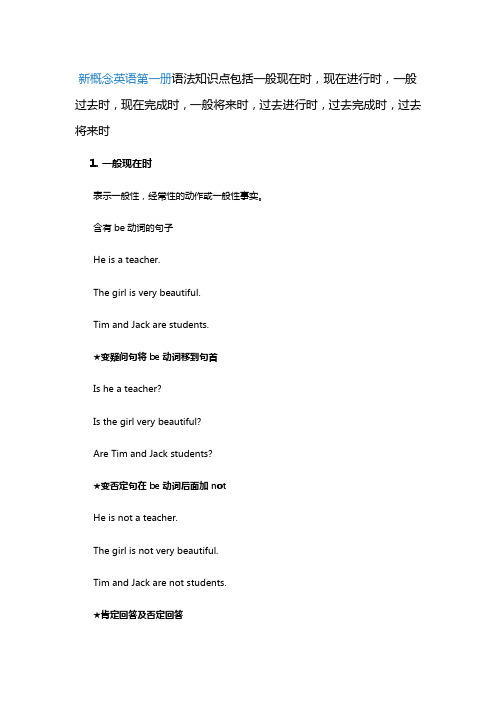
新概念英语第一册语法知识点包括一般现在时,现在进行时,一般过去时,现在完成时,一般将来时,过去进行时,过去完成时,过去将来时1. 一般现在时表示一般性,经常性的动作或一般性事实。
含有be动词的句子He is a teacher.The girl is very beautiful.Tim and Jack are students.★变疑问句将be动词移到句首Is he a teacher?Is the girl very beautiful?Are Tim and Jack students?★变否定句在be动词后面加notHe is not a teacher.The girl is not very beautiful.Tim and Jack are not students.★肯定回答及否定回答Yes, he is. No, he is not.Yes, she is. No, she is not.Yes, they are. No, they are not.★不含有be动词的句子,即含有一般动词的句子第三人称单数及单数名词He likes books.She likes him.The dog likes bones.★变疑问句在句首加does, 动词变为原型Does he like books?Does she like him?Does the dog like bones?★变否定句在主语及动词之间加doesn’t, 动词变为原型,原句中的动词不再有第三人称变化。
He doesn’t like books.She doesn’t like him.The dog doesn’t like bones.★肯定回答及否定回答:Yes, he does. No, he doesn’t.Yes, she does. No, she doesn’tYes, it does. No, it doesn’t.注意:第三人称单数形式一般在动词后面加S,不要和名词复数混淆,变否定句或疑问句时名词复数没有任何变化。
不定代词用法总结
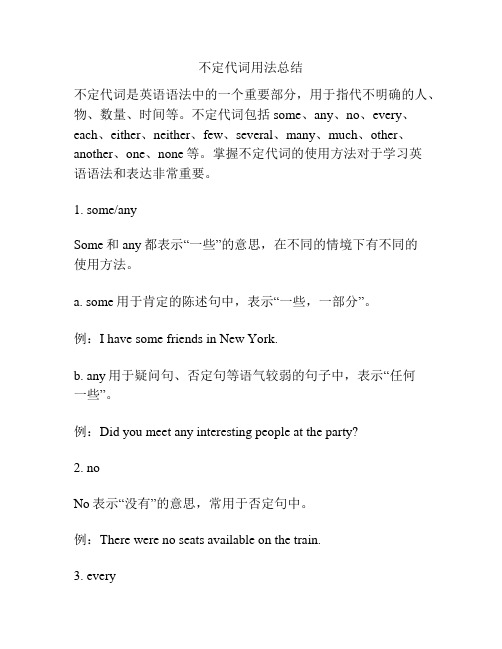
不定代词用法总结不定代词是英语语法中的一个重要部分,用于指代不明确的人、物、数量、时间等。
不定代词包括some、any、no、every、each、either、neither、few、several、many、much、other、another、one、none等。
掌握不定代词的使用方法对于学习英语语法和表达非常重要。
1. some/anySome和any都表示“一些”的意思,在不同的情境下有不同的使用方法。
a. some用于肯定的陈述句中,表示“一些,一部分”。
例:I have some friends in New York.b. any用于疑问句、否定句等语气较弱的句子中,表示“任何一些”。
例:Did you meet any interesting people at the party?2. noNo表示“没有”的意思,常用于否定句中。
例:There were no seats available on the train.3. everyEvery表示“每一个”的意思。
例:Every student is required to attend the meeting.4. eachEach表示“每一个”,用于强调个体。
例:Each student is responsible for his or her own progress.5. either/neitherEither表示“两者中的任何一个”,neither表示“两者都不”。
例:You can choose either the blue or the red dress.例:Neither of us likes to cook.6. few/several/many/much这些代词都用于表示数量或程度。
a. few表示“很少,几乎没有”。
例:There were few people in the park on such a hot day.b. several表示“几个,若干”。
some,any,many,much,little,few
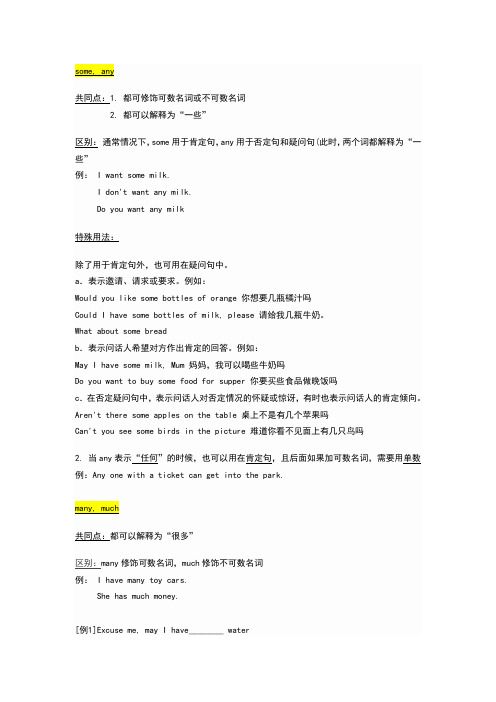
some, any共同点:1. 都可修饰可数名词或不可数名词2. 都可以解释为“一些”区别:通常情况下,some用于肯定句,any用于否定句和疑问句(此时,两个词都解释为“一些”例: I want some milk.I don't want any milk.Do you want any milk特殊用法:除了用于肯定句外,也可用在疑问句中。
a.表示邀请、请求或要求。
例如:Would you like some bottles of orange 你想要几瓶橘汁吗Could I have some bottles of milk, please 请给我几瓶牛奶。
What about some breadb.表示问话人希望对方作出肯定的回答。
例如:May I have some milk, Mum 妈妈,我可以喝些牛奶吗Do you want to buy some food for supper 你要买些食品做晚饭吗c.在否定疑问句中,表示问话人对否定情况的怀疑或惊讶,有时也表示问话人的肯定倾向。
Aren't there some apples on the table 桌上不是有几个苹果吗Can't you see some birds in the picture 难道你看不见面上有几只鸟吗2. 当any表示“任何”的时候,也可以用在肯定句,且后面如果加可数名词,需要用单数例:Any one with a ticket can get into the park.many, much共同点:都可以解释为“很多”区别:many修饰可数名词,much修饰不可数名词例: I have many toy cars.She has much money.[例1]Excuse me, may I have________ waterA. aB. someC. anyD. an分析:此题中的water一词是不可数名词,前面不能用a或an;不定代词some在这里表示建议,请求或盼望得到肯定回答。
some any many的区别和用法
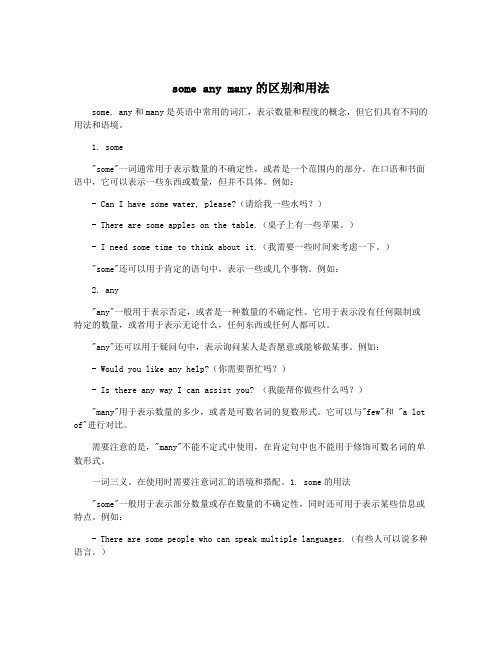
some any many的区别和用法some, any和many是英语中常用的词汇,表示数量和程度的概念,但它们具有不同的用法和语境。
1. some"some"一词通常用于表示数量的不确定性,或者是一个范围内的部分。
在口语和书面语中,它可以表示一些东西或数量,但并不具体。
例如:- Can I have some water, please?(请给我一些水吗?)- There are some apples on the table.(桌子上有一些苹果。
)- I need some time to think about it.(我需要一些时间来考虑一下。
)"some"还可以用于肯定的语句中,表示一些或几个事物。
例如:2. any"any"一般用于表示否定,或者是一种数量的不确定性。
它用于表示没有任何限制或特定的数量,或者用于表示无论什么,任何东西或任何人都可以。
"any"还可以用于疑问句中,表示询问某人是否愿意或能够做某事。
例如:- Would you like any help?(你需要帮忙吗?)- Is there any way I can assist you? (我能帮你做些什么吗?)"many"用于表示数量的多少,或者是可数名词的复数形式。
它可以与"few"和 "a lot of"进行对比。
需要注意的是,"many"不能不定式中使用,在肯定句中也不能用于修饰可数名词的单数形式。
一词三义。
在使用时需要注意词汇的语境和搭配。
1. some的用法"some"一般用于表示部分数量或存在数量的不确定性,同时还可用于表示某些信息或特点。
例如:- There are some people who can speak multiple languages.(有些人可以说多种语言。
any some many much
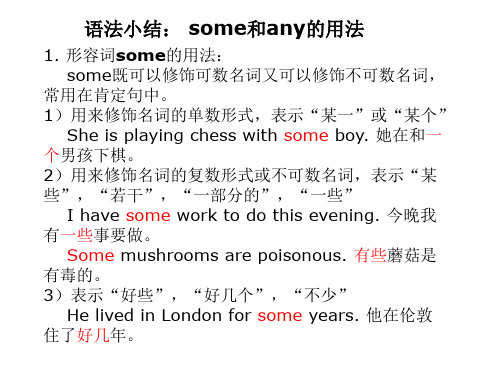
C. Write these sentences again. Use many or much.
1. 2. 3. 4. 5. I haven’t any butter. I haven’t got much butter. You haven’t any cigarettes. You haven’t got many cigarettes. We haven’t any milk. We haven’t got much milk. She hasn’t any biscuits. She hasn’t got many biscuits. They haven’t any stationery. They haven’t got much stationery.
语法小结:many和much的用法
many和much做形容词时都表示“许多”的意思, 但是,many用于修饰可数名词的复数形式,而much 用于修饰不可数名词。
语法小结:人称代词
1. 人称代词及其各种形式:
主格 I we you he she it they
宾格
形容词性物主代 词
me
my
us
our
语法小结: some和any的用法
1. 形容词some的用法: some既可以修饰可数名词又可以修饰不可数名词, 常用在肯定句中。 1)用来修饰名词的单数形式,表示“某一”或“某个” She is playing chess with some boy. 她在和一 个男孩下棋。 2)用来修饰名词的复数形式或不可数名词,表示“某 些”,“若干”,“一部分的”,“一些” I have some work to do this evening. 今晚我 有一些事要做。 Some mushrooms are poisonous. 有些蘑菇是 有毒的。 3)表示“好些”,“好几个”,“不少” He lived in London for some years. 他在伦敦 住了好几年。
any some many much 区别与用法

any some many much 区别与用法一、any的用法1. 用于疑问句和否定句中•Do you have any questions?(你有什么问题吗?)•I don’t have any money.(我没有任何钱。
)2. 用于表示“任何一个”或“不论哪一个”•You can take any book you like.(你可以拿任何一本你喜欢的书。
)•Any of these dresses will look good on you.(不论哪一件衣服都会很适合你。
)3. 用于表示“任何一种”或“不论哪种”•You can choose any color you want.(你可以选择任何一种你想要的颜色。
)•Any form of exercise is beneficial to your health.(任何形式的锻炼对你的健康都是有益的。
)二、some的用法1. 用于肯定句中,表示“一些”或“几个”•I bought some fruits at the market.(我在市场上买了一些水果。
)•Can you lend me some pens?(你能借给我一些钢笔吗?)2. 用于请求或建议,表示“一些”或“几个”•Could you please bring me some water?(你能给我拿一些水吗?)•Let’s make some cookies for the party.(我们为聚会做些饼干吧。
)3. 用于表示数量不确定或未指定的情况•I have some free time this afternoon.(今天下午我有些空闲时间。
)•She has been to some European countries.(她去过一些欧洲国家。
)三、many的用法1. 用于问句中,表示数量,常用于可数名词复数•How many apples do you want?(你想要多少个苹果?)•How many books did she read last month?(她上个月读了多少本书?)2. 用于肯定句中,表示很多或许多•Many students enjoy playing sports.(很多学生喜欢运动。
新概念英语第一册限定词及情态动词用法总结
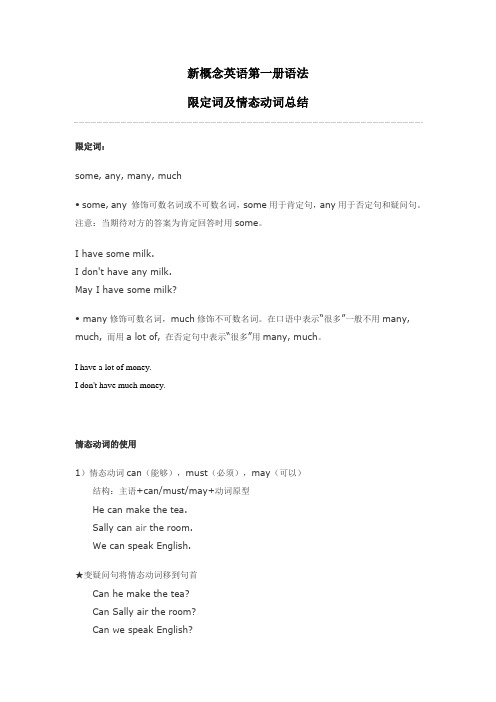
新概念英语第一册语法限定词及情态动词总结限定词:some, any, many, much• some, any 修饰可数名词或不可数名词,some用于肯定句,any用于否定句和疑问句。
注意:当期待对方的答案为肯定回答时用some。
I have some milk.I don't have any milk.May I have some milk?• many修饰可数名词,much修饰不可数名词。
在口语中表示“很多”一般不用many, much, 而用a lot of, 在否定句中表示“很多”用many, much。
I have a lot of money.I don't have much money.情态动词的使用1)情态动词can(能够),must(必须),may(可以)结构:主语+can/must/may+动词原型He can make the tea.Sally can air the room.We can speak English.★变疑问句将情态动词移到句首Can he make the tea?Can Sally air the room?Can we speak English?★变否定句在情态动词后面加notHe cannot make the tea.Sally cannot air the room.We cannot speak English.★肯定回答及否定回答Yes, he can. / No, he cannot.Yes, she can. / No, she cannot.Yes, we can. / No, we cannot.★特殊疑问句:(必背)What can you do?注意:情态动词的句子没有第三人称单数的变化,不要在情态动词或动词后面加s。
2)must/have to的区别must 表示必须,是主观上觉得应该做,have to是不得不,是由于客观条件逼迫的必要要做must 只能用在表示现在和将来的句子里,而have to do可以用在任何时态3)must, may, might表示猜测:· must do 表示对现在事实的猜测· must have done表示对过去事实的猜测· must have been doing 表示对过去正在进行的事实的猜测· may/might do, may/might have done表示没有任何事实依据的猜测,might 的可能性更小。
不定代词的用法

Either Wei Hua or Ann may be on the team.
Either you or I can get the film ticket.
(3)neither一般指”两者都不”。neither后接单数名词,动词也用单数。例如:Neither of them is on the team.(主语)
He doesn’t like red shirts. He likes white ones.
3. other, another, others和the others
(1)other(两个中的)另一个,另一些,其他的。在句中作主语、宾语、定语。相当于名词时,有复数形式others.还有所有格形式other''s和others''.other之前常用定冠词the.
这些词作定语时较多有时也可作主语或宾语。例如:
Lucy and Lily have a few small differences.(定语)
In a few year''s time,these mountains will be covered with trees.(定语)
We have a little time,so we can listen to Tom''s song.(定语)
I agree with neigher of you.(宾语)
Neither knife is good.(定语)
neither...nor...的意思是既不……也不。例如:
One should always be strict with oneself.
限定词some,any,many,much,more,most,lots,few,

第二/三…
Canada, the second largest country in the world, lies in the north of America
little/few
little (less/least), few (fewer/fewest)
the most + n.(可数/不可数): 最多/最高的…
the most children最多的孩子
the most trouble最多的麻烦
most+ n.(可数/不可数):大多数的…
most people/most research
most of the +n.(可数/不可数) 大多数的
These?activities?occupied?most?of?her?time.这些活动占用了她大部分时间。
相关搭配:
the more…, the more…越…,就越...
The more I thought about it, the less I liked the idea
more and more + adj./ adv.越来越…
Changan?Avenue?is getting?more?and?more?beautiful.
相关搭配:
at most最多(反义词组at least至少)
It’ll take 20 minutes at the most.?
most 最、非常
Ilike English most/best.我最喜欢英语。
Thank you for a most interesting evening.
some-any-many-much-little-few知识讲解
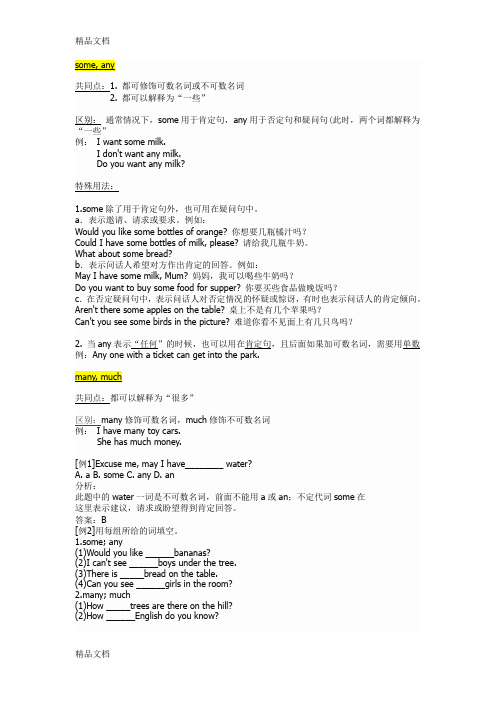
some, any共同点:1. 都可修饰可数名词或不可数名词2. 都可以解释为“一些”区别:通常情况下,some用于肯定句,any用于否定句和疑问句(此时,两个词都解释为“一些”例:I want some milk.I don't want any milk.Do you want any milk?特殊用法:1.some除了用于肯定句外,也可用在疑问句中。
a.表示邀请、请求或要求。
例如:Would you like some bottles of orange? 你想要几瓶橘汁吗?Could I have some bottles of milk, please? 请给我几瓶牛奶。
What about some bread?b.表示问话人希望对方作出肯定的回答。
例如:May I have some milk, Mum? 妈妈,我可以喝些牛奶吗?Do you want to buy some food for supper? 你要买些食品做晚饭吗?c.在否定疑问句中,表示问话人对否定情况的怀疑或惊讶,有时也表示问话人的肯定倾向。
Aren't there some apples on the table? 桌上不是有几个苹果吗?Can't you see some birds in the picture? 难道你看不见面上有几只鸟吗?2. 当any表示“任何”的时候,也可以用在肯定句,且后面如果加可数名词,需要用单数例:Any one with a ticket can get into the park.many, much共同点:都可以解释为“很多”区别:many修饰可数名词,much修饰不可数名词例:I have many toy cars.She has much money.[例1]Excuse me, may I have________ water?A. aB. someC. anyD. an分析:此题中的water一词是不可数名词,前面不能用a或an;不定代词some在这里表示建议,请求或盼望得到肯定回答。
must与have to的区别。manymuchsomeanya lot ofa fewa little的区别
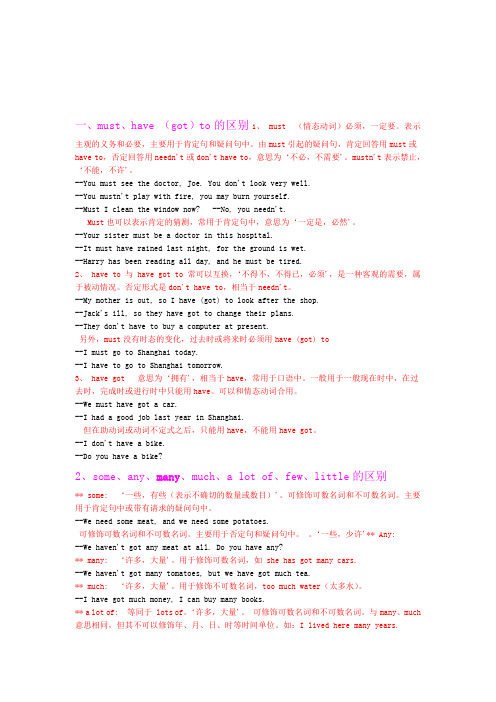
一、must、have (got)to的区别1、must (情态动词)必须,一定要。
表示主观的义务和必要,主要用于肯定句和疑问句中。
由must引起的疑问句,肯定回答用must或have to,否定回答用needn't或don't have to,意思为‘不必,不需要'。
mustn't表示禁止,‘不能,不许'。
--You must see the doctor, Joe. You don't look very well.--You mustn't play with fire, you may burn yourself.--Must I clean the window now? --No, you needn't.Must也可以表示肯定的猜测,常用于肯定句中,意思为‘一定是,必然'。
--Your sister must be a doctor in this hospital.--It must have rained last night, for the ground is wet.--Harry has been reading all day, and he must be tired.2、have to 与 have got to 常可以互换,‘不得不,不得已,必须',是一种客观的需要,属于被动情况。
否定形式是don't have to,相当于needn't。
--My mother is out, so I have (got) to look after the shop.--Jack's ill, so they have got to change their plans.--They don't have to buy a computer at present.另外,must没有时态的变化,过去时或将来时必须用have (got) to--I must go to Shanghai today.--I have to go to Shanghai tomorrow.3、have got 意思为‘拥有',相当于have,常用于口语中。
